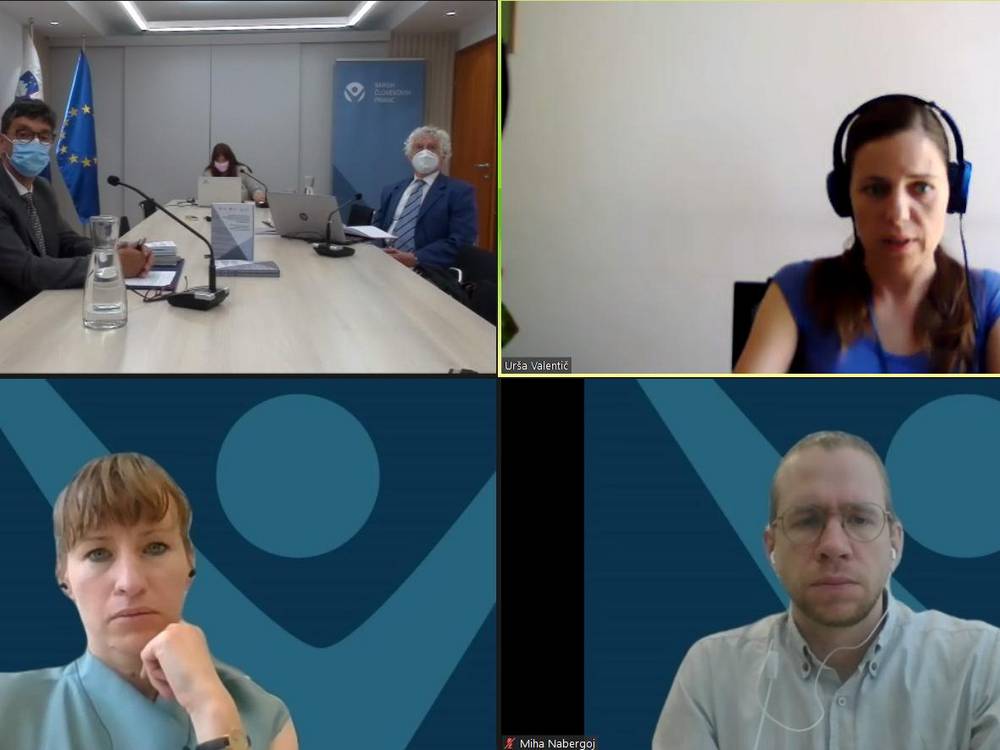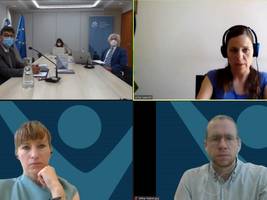Today, the Ombudsman hosted an online event at which he presented an analysis of the practice in prosecuting the crime of public incitement to hatred, violence and intolerance in the period from 2008 to 2018. The presentation was followed by a discussion with eminent experts who have been or still are dealing with hate speech, focusing on the observations and practice of prosecuting hate speech in Slovenia, including online.
The Ombudsman constantly draws attention to the importance of the ethics of public words and notes with concern that hate speech and inappropriate, disrespectful and unethical expressions are increasingly present in public. One of the reasons for performing an analysis is the warnings of the United Nations Human Rights Committee and the European Commission against Racism and Intolerance of the Council of Europe (2019) about the rise of hate speech on the internet, and their concern that cases of hate speech are almost never prosecuted in Slovenia.
The Ombudsman condemns the incitement of hatred, intolerance and inequality. “I have repeatedly called on everyone involved in the public debate, especially those in power, to avoid inciting hatred or intolerance on the basis of any personal circumstances in their communication. I also draw attention to the importance of self-regulatory mechanisms and the immediate response to hate speech where it occurs,” said the Ombudsman Peter Svetina at the presentation of the analysis.
The purpose of the analysis conducted by the Human Rights Centre of the Ombudsman is to offer insight into and contribute to understanding the actual practice as regards the prosecution of the criminal offences of public incitement to hatred, violence or intolerance under Article 297 of the Criminal Code (KZ-1). Since the term ‘hate speech’ is not known in the Slovenian legal system – it is usually mentioned in the context of Article 297 of KZ-1 – the law operates with the term ‘so-called hate speech’, explained the assistant head of the Human Rights Centre of the Ombudsman of the Republic of Slovenia, Simona Drenik Bavdek.
The analysis showed, among other things, that out of the 145 closed prosecution files or cases, almost a quarter ended with a sanction for the perpetrator. The most common were suspended sentences of one to six months of imprisonment and the assignment of various tasks based on suspended prosecution. The Ombudsman also found in the analysis that most of the 243 suspects were not public figures, but ordinary individuals. Most of the controversial or hostile statements were posted on online forums and social networks. The majority targeted LGBTI+ people, Roma, members of the nations of the former Yugoslavia, people with different political beliefs, Muslims, refugees and migrants, and blacks.
The analysis shows that in the period 2008-2012, almost half of the cases were related to hate speech on social networks, online forums and in comments in online media, while the share in the period 2013-2018 was only 16%. While prosecutors filed charges or opted for suspended prosecution in half of the cases (20) in the period 2008-2012, the Ombudsman found only one case of suspended prosecution in the period 2013-2018 and no charges filed in cases of online hate speech. “Why prosecutors dealt with fewer cases of online hate speech during this period, however, remains a question,” said Jerneja Turin, adviser and analyst at the Human Rights Centre.
The frequency of complaints does not necessarily reflect the real state of incitement to hostility towards individuals or groups, as not all cases of such conduct are reported, said Miha Nabergoj, adviser and analyst at the Human Rights Centre, and Urša Valentič, coordinator of the Web Eye project, agreed with him in the discussion following the presentation of the analysis. Nabergoj also spoke about the possibility of recognising the right of individuals or groups to subsidiary criminal prosecution in the event that the prosecutor suspends or does not initiate prosecution, and he also touched upon hate crimes. The prosecution is also striving for the recognition of groups as subsidiary victims, while the search for a reasonable compromise position is still ongoing, said Andrej Ferlinc, former Supreme State Prosecutor and head of the criminal department at the Supreme State Prosecutor's Office. He also pointed out that only case law will show to what extent it is possible to extend a criminal offence under Article 297 of KZ-1 to other circumstances.
He welcomed the Centre's analysis and emphasised the common goal of both the prosecution and the Ombudsman, as well as other bodies and civil society, to curb the phenomenon of hate speech in public spaces. “Hate speech takes away the dignity of both the one who utters it and the one it targets,” he emphasised in the introduction. The analysis also examines the impact of requests for the protection of legality, which Mr Ferlinc filed while still in the capacity of the Supreme State Prosecutor with the view that the legal sign that an act committed “in a manner that may endanger or disturb public order or peace, or through the use of threats, insults and defamation” should be understood alternatively and not cumulatively. The analysis showed that in practice some prosecutors did interpret these legal signs of a criminal offence referred to in Article 297 of KZ-1 in a restrictive manner, which did not have a significant effect on the dismissal of complaints. Mr Ferlinc also warned of the danger of hostile expressions by prominent public figures, which can be very suggestive for certain individuals who quickly move from words to action. “Explicit or implicit demands to make political beliefs a subject of prosecution under Article 297 of KZ-1 are not appropriate. Law enforcement bodies cannot become the ground for balancing political contradictions,” he added.
Breda Gačnik, a senior criminal inspector specialist from the Criminal Police Directorate at the General Police Directorate, also welcomed the Centre's analysis and said that the cooperation of law enforcement bodies is good in this area, as is the cooperation with Web Eye. She recalled that in 2019, the General Police Directorate developed new guidelines for the proper qualification of this crime. As a result of the epidemic, life has largely been transferred to the virtual environment of computers. The tools contributed by the Internet have made it possible to protect the individual in the safe embrace of home and increased the anonymous spread of intolerance, hostility and other forms of inappropriate communication. The real pressure of the social environment on unwanted behaviours has decreased, which is also observed by the Ombudsman’s Office, added Simona Drenik Bavdek. The GPD conducted an analysis for the period from 2016 to 2020, in which the incidence of impatient and hostile communication skyrocketed. Breda Gačnik highlighted the lack of appropriate tools for the systematic monitoring of hate speech, and technology and engineering as key to the successful prosecution of online hate speech.
Urša Valentič, coordinator of the Web Eye project, emphasised that the surprising thing when reading the analysis was that many of the Prosecutor's Office's decisions were unreasoned, which made it impossible to identify the reasons for dismissing a complaint, but that she understood the legal provisions that allow it. She pointed out that in the period from 2008 to 2018, Web Eye reported 560 cases of alleged hate speech to the Prosecutor's Office. She also pointed out that prosecution initiated by a private lawsuit or a motion does not usually occur, although citizens are warned that in some cases there is no possibility of prosecution under Article 297 KZ-1 but that other grounds for punishing perpetrators are possible.
The participants agreed that prosecuting inappropriate expressions should be a last resort. Curbing hate speech and efforts to ensure an inclusive society of different views require different types of action. The event participants emphasised that many challenges remain in the technical and technological field, and that cooperation between institutions, law enforcement and judicial bodies and civil society is essential.

